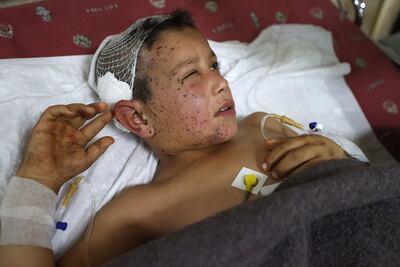Ahmed Qasoum was filming the journey to his parents’ home to send a video to his daughter living in Turkey. She is one of 13 million Syrians displaced in the past 10 years who may never return home.
“I did not know that I was actually documenting a disaster that would change our lives,” he said.
air strike victim
The video Mr Qasoum was shooting caught the moment a US drone strike – targeting the leader of the Al Qaeda-affiliated Guardians of Religion organisation – hit, injuring him and his family.
The car was almost completely destroyed in the attack, between Idlib and Arihah, which was intended to hit the militant on a motorbike.
Mahmoud,10, was among the wounded, sustaining serious injuries. He has been in intensive care since last Saturday.

Centcom, the general headquarters of US forces in the Middle East, said that the Al Qaeda commander had been killed in the strike.
Guardians of Religion has been the target of US drone operations since its formation in 2017. The US admitted that civilians were injured and said that investigations were under way.
Metres from a drone strike
“Joy has turned into bloodshed”, Mr Qasoum said of their journey.
They had not visited their grandparents' home in 10 months, in Al Rami village on the outskirts of Idlib city.
“We decided to visit them early in the winter, we were happily going back with the kids. Suddenly, we were surrounded by blood inside and outside the car, blood covering my eyes so I could no longer see.”
Mr Qasoum has lived with his family in Afrin, 80 kilometres from Idlib, since they were displaced from Kafr Battik, a small village that was heavily bombed by the Russian air force and retaken by government forces in 2019.
But almost nowhere can be considered safe in northern Syria, including the village of Al Rami.
Mr Qasoum's daughter in Turkey, who recently got married, suggested the video.
“When we told her we were going to visit her grandparents in Idlib she asked us to film the journey back and forth,” Mr Qasoum said.
There was a man on a motorbike trying to overtake them, he said.
“The motorbike suddenly turned into fragments. I could not hear the explosion sound but the fragments hit the left side of the car and devastated it. I was injured in my head,” he said.
People quickly gathered around and took them to the hospital.
“We were bleeding and could not wait for the ambulance and White Helmets to arrive," he said, referring to a local search and rescue organisation established by Syrians opposed to the government. "I didn’t lose consciousness before we arrived at the hospital. I did not know who rescued us and how.”
Ahmed’s wife Fatima Qarqaa, 48, recalls the incident.
“I was not conscious of what had happened. The car door opened ... while the car was moving very fast. My kids fell on the pavement while my husband was hit in his head and I was hit in my leg," she said.
"My younger boy got injured in his head. I saw him bleeding horribly. I did not realise how we got injured or when.”
She went on to say that her husband got up to check on his children despite being injured as people gathered around them.
No accountability
Mr Qasoum now faces great difficulty to meet the medical costs of surgery and drugs for his family, as well their material loss.
“I’ve lost my car, which is no longer useful for anything, it’s full of fragments. One pill of medicine costs around 400 Turkish pounds and I can’t provide all these expenses. Furthermore, my kids’ injuries will take a long time to heal.”
The family was rushed to the Syrian American Medical Society Hospital in Idlib.
“We have taken the required procedures, said Dr Ahmed Al Biosh, a pulmonologist and respiratory physician at the hospital’s intensive care ward.
He described Mahmoud's state after performing first aid and an initial operation as stable after being in a critical condition when he arrived.
“There was a cerebrospinal fluid leak plus trauma in the skull. He underwent a surgical operation and was connected to artificial respiration in intensive care for 48 hours,” Dr Al Biosh said.
Mahmoud was released from intensive care without displaying any neurological damage, but had a temperature so a cerebrospinal fluid sample was taken to make sure he was not infected with meningitis.
“It is necessary to keep monitoring him after his release to see if he [will] get back to normal,” Dr Al Bios said.
Mr Qasoum said: “I hold the responsibility of the damage to the international bodies that targeted me with my family. I am a civilian not related to any military or political bodies. I am just a poor farmer who makes my living from different jobs I work in, after I lost my job previously,” he said.
Ms Qarqaa said she fears for her children’s future, even if they recover from their injuries.
“I do not know who could relieve us of our loss. My leg that I could no longer walk on normally. My son Waleed and my daughter Batoul were injured in their limbs,” she said.
“I’m afraid the psychological effect could impact them. I am now afraid of getting in a car and hearing the sound of air strikes. It seems we won’t get back to normal,” she said.
